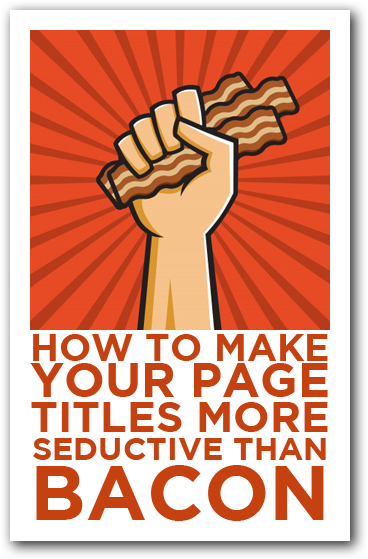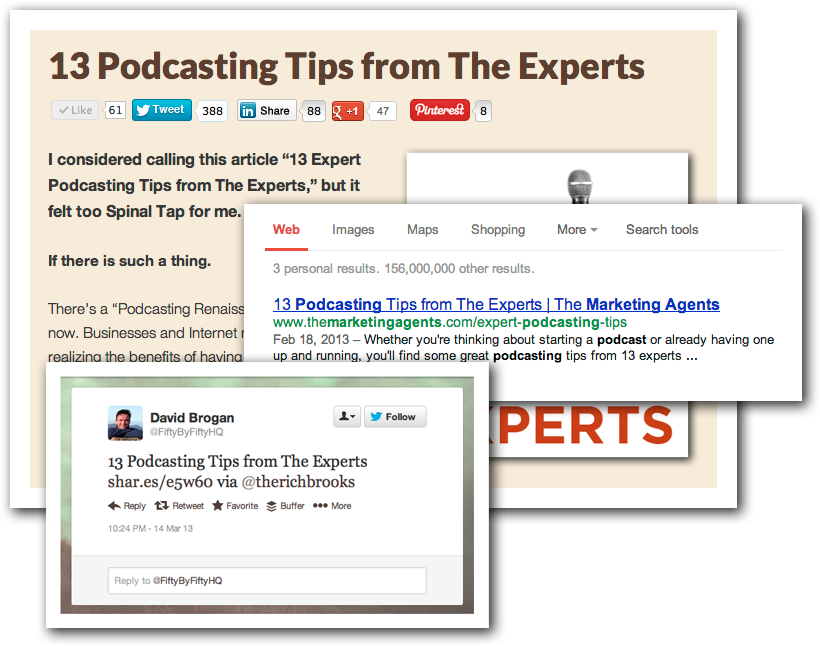 If your content is a breakfast buffet, your title tags are the bacon.
If your content is a breakfast buffet, your title tags are the bacon.
Nobody shows up to an all-you-can-eat breakfast buffet for the scrambled eggs. Or the wheat bread. Or the yogurt. We come for the bacon. We smell it before we even get into the restaurant.
Or, if we’re making it at home, we hear the pop and sizzle as it cooks up in the pan and our mouths begin to water. The anticipation of bacon is almost as good as the meat itself. (Baconticipation?)
If you’re vegetarian or Kosher you’re just going to have to go with me on this.
Bacon causes people to write music. To decorate their bodies with tattoos. And to wrap less desirable food in its juicy, succulent embrace.
The bacon is a siren song that gets us belly up to the breakfast bar. And sure, we’ll add waffles, eggs and hash browns to our plate…but only so we don’t look like a bacon junkie.
Likewise, a title tag can tantalize…seduce us into clicking on a link and visiting a website. By crafting succulent, keyword-rich titles you can drive more traffic to your website, your blog, or even your YouTube videos.
Like the smell of bacon wafting from a kitchen, your title tags appear all over the web, ready to reel in readers. They become the big blue links in the search engine results. They appear when someone shares your content on Facebook, LinkedIn or Twitter. When someone links to an article, blog post or video you created, they often use your title as the link.

And just like bacon causes a chemical reaction that is enough to “tempt even the strongest of vegetarians,” you need to understand the right keywords to attract your audience.
Crafting Keyword-Rich Titles
“Keywords” is just another way of saying “the words your customers and prospects are searching for,” whether that’s at Google or on a social network. It’s the “chemical compound” that first attracts your user.
You want to put your keywords in your title because that’s arguably the most important factor in ranking higher at the search engines. In fact, if you’ve never optimized the titles on your website, just making improvements on each page title can greatly increase the amount and quality of traffic you’re attracting!
I strongly recommend performing a keyword analysis to help uncover your most promising keywords. Once you know your keywords, you can start improving your title tags on your current website pages, or create new pages based on your findings.
Here are some tips for improving your website’s title tags:
- Lead with your best keywords. An article that explains how to use chopsticks might read, “Chopstick Instructions: Eating Chinese Food Without A Fork or Knife.“
- The colon is your friend. Try and find a way of working in the keyword phrase–or a related one–twice. The article above might have also been called “Chopstick Instructions: How to Use Chopsticks,” to take advantage of multiple, similar searches.
- Every web page deserves a unique title. Remember that every page on your site is another opportunity to be found by your ideal customers via the search engines. That means that you don’t want to use the same title on every page. The title of your bookkeeping page might read “Maine Bookkeeping Services: Balancing Your Books,” while your accounting page might be titled, “Maine CPA: Accounting Services for Maine Businesses.” (Pro tip: this only works in Maine. For other states and countries please consult a local authority.)
Remember that a title is more than just keywords. Search engines have gotten smarter over the years, and pages that just cram keywords into the titles often don’t rank very well. Even a bacon sandwich comes with two pieces of bread.
Crafting Mouthwatering, Persuasive Titles
Your title tag is often the first impression people have of your company. It’s the big blue link on the search engine results page or it’s in the tweet or Facebook link their friend posted. In other words: it’s often all they have to go on. Make sure it’s mouthwatering. Give it a “come hither” look people can’t refuse.
Compare these two titles:
- The Nutritional Content of Your Child’s School Lunch, or
- School Lunches: Are They Killing Your Children Slowly?
Yes, perhaps the second one is a bit sensational, but you can be sure it’s getting way more clicks.
Make sure your title tag is persuasive without being deceptive…no one’s coming back to your breakfast buffet if you try and pass off tofu bacon as the real McCoy. (No fakin’ the bacon.)
While stretching the truth too far or being outrightly deceptive might get you a few extra page views, people will quickly click away once they realize they’ve been hoodwinked, and they’re unlikely to ever return or trust you again.
When you craft a juicy, delicious title, your readers will be more likely to share it through their social networks, driving traffic back to your site. Often, when a title is succulent enough, people will share it before they even read the article!
Since search engines are now looking at social networks to better understand if your site should rank higher, you need to create content that gets shared.
Here are some tried and true recipes for savory titles:
- Create numbered lists. Numbered lists work because we feel we’re too busy to really learn a new subject, no matter how important. But if you can show us “101 Ways to Save Money for College,” we’re all in.
- Say “how-to.” Most of us spend a lot of our time online trying to figure out how to do stuff. Letting us know you’re going to show us how to macrame or wind surf is enough to get us to click.
- Reference something topical. Working in the zeitgeist is sure to get additional clicks. “What Duck Dynasty Can Teach Us About Family Business” or “The Honey Boo Boo Guide to Getting What You Want at Work” are sure winners. (And, if I’ve done my job right, no one reading this in five years will have any idea what I’m referring to.)
Takeaways
Just as bacon lures people to breakfast, your titles need to tempt people to read and share your content.
Keyword-rich titles improve your search engine visibility. Compelling titles will get your content shared more frequently in social media.
The trick is to create titles that are both keyword-rich for the search engines, and compelling enough for your ideal customers and their networks.
You can then use these titles on your website pages, your blog posts, and your YouTube video to increase your online visibility and drive more qualified traffic to your site.
Bon Appetit!
So, what do you think? Please let me know in the comments section below!